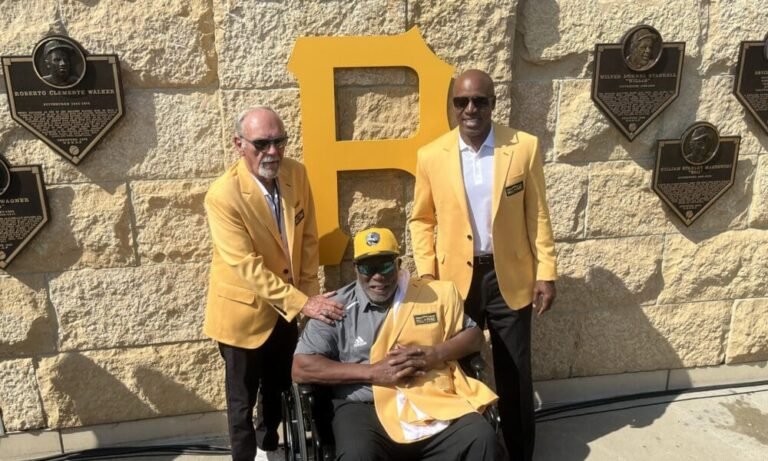The question caught me a bit off guard but was interesting to ponder.
I was a guest on 93.7 The Fan on Saturday morning and host Austin Bechtold asked if I thought the Pittsburgh Pirates would retire Barry Bonds’ No. 24. It was a fitting question on a day when the Pirates inducted Bonds into the team’s Hall of Fame.
My initial reaction was to answer no, especially since I had not heard any scuttlebutt around the Pirates’ organization that the idea was under consideration. It is telling that Bonds wasn’t inducted until the Pirates Hall’s third class.
However, you can make a case that the Pirates should at least consider immortalizing Bonds for a second time.
Bonds is the only two-time National League MVP winner in franchise history.
Bonds won voting by a panel of Baseball Writers Association of America members in 1990 and 1992. He should have won in 1991, but the award went to Atlanta Braves third baseman Terry Pendleton because he was more accommodating to the media than the prickly Bonds.
It pains me to write that as a 37-year member of the BBWAA. Voters should decide the awards on merit rather than personality. Yet bias remains part of the process, though not to the extent that it was 33 years ago.
Something to note, though, is the MVP did not come into existence in its current form until 1924. That was seven years after legendary shortstop Honus Wagner retired from the Pirates.
Wagner led the National League in bWAR 11 times in 13 years from 1900-12. Surely, he would have won multiple MVP awards as well.
Nevertheless, Bonds has the unique distinction in franchise history as a multiple MVP. He also won the Gold Glove and Silver Slugger awards for three straight seasons from 1990-92 while leading the Pirates to the National League East title each year.
Those remain the Pirates’ last three divisions crowns more than three decades later. Bonds, manager Jim Leyland — also inducted into the Pirates’ HoF on Saturday — and general manager Syd Thrift were the three biggest reasons the Pirates’ fortunes turned after the franchise almost moved in 1985.
Leyland took over as manager to start the 1986 season and Bonds made his big-league debut that season.
However, one factor working against Bonds having his number retired is longevity. He played just seven years with the Pirates before signing with the San Francisco Giants as a free agent following the 1992 season.
It was not necessarily a case of Bonds walking away from the Pirates. The team never offered a contract extension in ’92 even though Bonds was willing to listen.
Bonds played his last 15 seasons with the Giants, set the all-time MLB home run record in their uniform, and now works for them as a special assistant. Outside Pittsburgh, fans identify Bonds more as a Giant than a Pirate.
The Pirates set a precedent for retiring the number of a slugger who did not have an especially lengthy career in Pittsburgh, though, when they took Ralph Kiner’s No. 4 out of commission. Kiner played just 7.5 seasons from 1946-53 with the Pirates but led the NL in homers in his seven full seasons.
Kiner was the biggest drawing card in franchise history, and I’ll debate anyone on that all day long. The Pirates had never drawn one million fans in a season until 1947 then did it four years in a row.
Bonds didn’t have that kind of cache and because of his personality, he did not have the same popularity with Pirates fans.
So, should the Pirates follow suit and retire Bonds’ number? A good case can be made either way.
I’d lean towards no.

